A quarter of Hungarians support closer ties with Russia, but even Fidesz and Mi Hazánk voters are pro-NATO
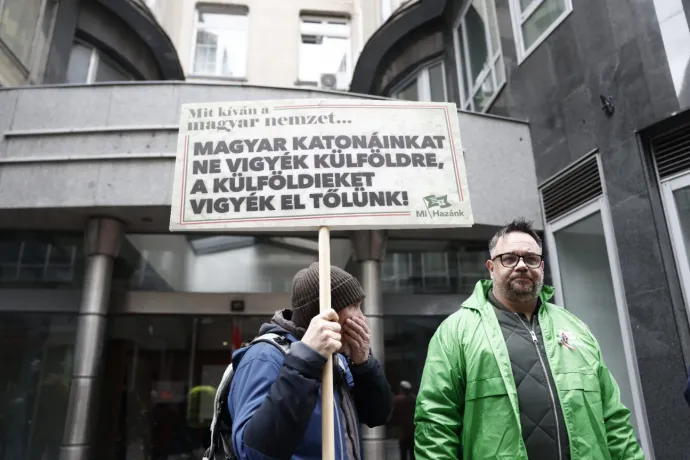
The number of Hungarians who say they want closer cooperation with Russia has doubled in two years and now stands at 26 percent. Many see Zelensky as a negative figure – especially pro-government voters – but neither side's voters would leave NATO, and the military alliance is perceived as well as it was when Hungary first joined its ranks. In their latest research, Policy Solutions examined how Hungarians view the world in 2023. Where do we see ourselves in the world? How do most people feel about important international issues?
The research focused especially on where Hungarian society sees the country's future in terms of values. The majority of Hungarians (55%) still believe that in 2023 the country traditionally belongs to the West in terms of values and should continue to move closer to these partners. In fact, regardless of whether the West is declining (a popular government narrative – TN) or not, Western values have become even more popular compared to 2021. On the other hand, one in five governing party voters disagree with the country's affiliation with the West, but most of them (46%) still see Hungary's future in the West.
The poll was conducted between 27 March and 4 April 2023 by Závecz Research. The survey, which involved face-to-face interviews with 1,000 people, is representative of the country's adult population according to gender, education and type of settlement where the respondents live. Four categories of political affiliation were applied: six-party opposition, Fidesz-KDNP, Mi Hazánk, and the undecided.
There are still relatively few who believe that it is in Hungary's interest to move closer to Russia and away from the European Union (26 per cent). A relative majority – 45 per cent – reject closer cooperation with Russia, a trend that has not changed in either direction despite the war. However,
twice as many people support a closer relationship with Russia compared to 2021: their number went up from 13 to 26 percent.
Those in favour of rapprochement with Russia are most numerous among Fidesz-KDNP voters (35%), but there are also plenty of them on the opposition side: a quarter of them support this position, while the majority (60%) reject it. It is also interesting to note that Mi Hazánk voters are only as pro-Russian as the supporters of the six-party opposition: a quarter of them support, while 51% reject developing closer ties with Russia.
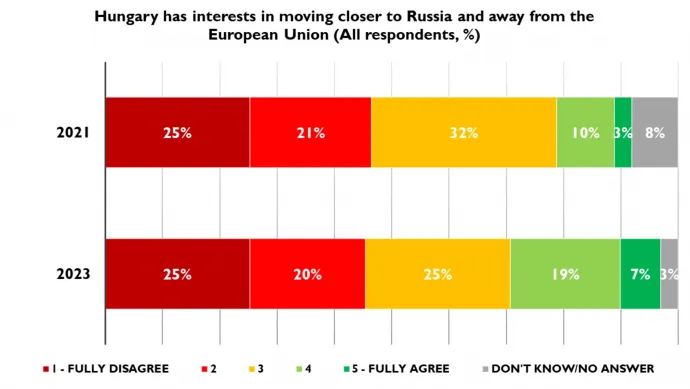
The government's approach that one of the most important tasks of Hungarian foreign policy is to defend national sovereignty is slightly more popular among the majority than the idea that the country should cooperate with its Western allies. Nearly half of governing party voters consider the defence of sovereignty to be particularly important. Among the six-party opposition voters, the majority (44%) think that Hungary should first and foremost forge closer ties with its Western allies, and they rank independence and sovereignty third.
The survey also looked at which countries Hungarians think it is important to have good relations with. The results are hardly surprising given that the top-ranked countries all have a signficiant number of Hungarian nationals working in them: Germany, Austria and the UK. When asked about a specific country, Austria was clearly the country which respondents ranked first as the most important to have good (neighbourly) relations with, followed closely by Germany, while Croatia ranked third.
Even among Mi Hazánk voters, more were of the opinion that good relations with Ukraine are also necessary, than among the governing party voters.
Russia, China and Ukraine all ranked at the bottom of the list of 17 countries – perhaps unsurprisingly, Fidesz voters ranked Ukraine's partnership as the least important, while opposition voters ranked Russia's.
The survey also looked at which countries Hungarians see as the biggest threats. Here again, voters are aligned with the narrative of their preferred party:
the majority of Fidesz voters see Ukraine as a major threat (46 percent), while voters of the six-party opposition clearly (64 percent) regard Russia as such.
Interestingly enough, the United States came second on the list of threats among governing party voters. This somewhat contradicts what the survey also revealed: that the United States is still identified by many with prosperity and freedom, but there are also many who think the country is aggressively expansionist. In fact, it is the Mi Hazánk voters (71%) who most identify the US with prosperity, followed by the six-party opposition voters and finally, those of Fidesz-KDNP.
In addition to measuring pro-EU sentiment, the popularity of the Hungarian membership of NATO is relatively rarely examined, but Policy Solutions looked at this in their recent survey as well. The research shows that confidence has changed little over the past 25 years:
a substantial majority of society is pro-NATO, with 76 percent still supporting Hungary's membership in the alliance.
Even after 24 years of membership, this proportion is very similar to that in the referendum before accession, when 85% voted to join and only 14% would have preferred to stay out of NATO. Among party voters, there is a broad consensus on this issue: there is no party in Hungary that does not have a two-thirds majority of voters in favour of Hungary's membership in NATO. Momentum voters are the most pro-NATO and Mi Hazánk voters the least, but even they have two-third support for the alliance. The alliance is also popular within Fidesz-KDNP, where 72 percent would choose to remain.
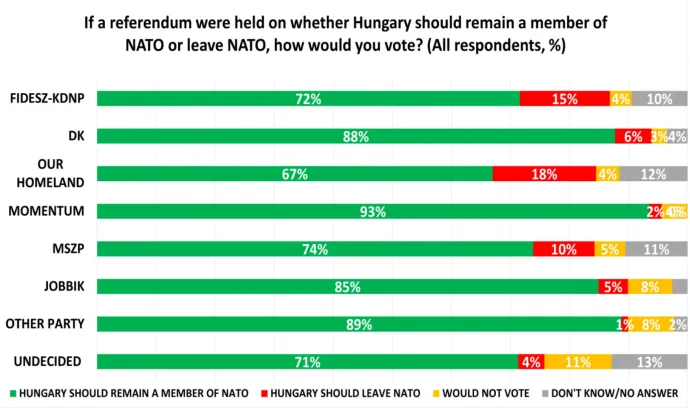
The survey indicates that Hungarian society likes to "hide behind the EU". One such issue is financial support for Ukraine: a large majority agrees that Hungary should support Ukraine through the EU, but two thirds reject direct support.
On the other hand, there is full agreement about not giving weapons to the Ukrainians either directly or through the EU.
An interesting aspect of these assumptions was also the respondents' media consumption habits: TV2 (strongly pro-government station -TN) viewers are much less supportive of Ukraine than, for example, the regular viewers of RTL, who would be more supportive of sending aid via the EU. Telex.hu's readership supported EU aid and some form of Hungarian aid as well, the research found.
Government: the Brussels sanctions are bad, Hungarian society: yes, they are
Hungarians' empathy for Ukrainians has been somewhat eroded by the war, which has been going on for almost a year and a half. According to the survey, only 16 percent of the population would feel comfortable – compared to 25 percent in the past – if a Ukrainian moved to their neighbourhood, and 43 percent would feel uncomfortable. However,
the survey shows that the majority still has the most negative view of refugees from the Middle East.
A phrase often heard from the government is "we must stay out of the war" and "the opposition would drag Hungary into the conflict in our neighbourhood". 80 percent of those polled admit that the government intends to stay out of the war, while 59 percent fear that Hungary will be dragged into the fighting.
Even voters in the six-party opposition hardly question the government's "pro-peace" stance. An intriguing find of the survey is that, although a majority of all political groups rejected the assumption,
a fifth of Fidesz-supporting respondents agree that the government's goal is to eventually annex Transcarpathia back to Hungary.
The government's "accusation" that the opposition is pro-war is less likely to go down well with voters: a majority – 55 per cent – do not think the six-party opposition would send Hungarian soldiers to fight in Ukraine. Four out of ten respondents accept the government's claim, however.
The government's answer to every bad economic indicator lately has been that the country is where it is because of " the Brussels sanctions". Of those surveyed, 44% say that sanctions have hurt the EU economy more than Russia. Only 11% agree that EU sanctions have actually hurt Russia.
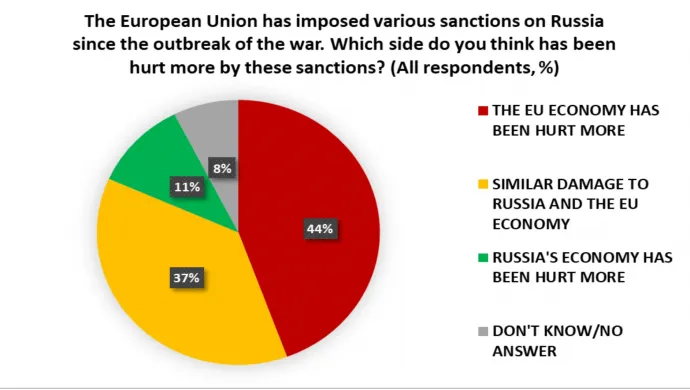
The majority is not able to ascertain the outcome of the war or whether it will continue, but the survey shows that a high proportion of Hungarian society doesn't believe that the Ukrainians have a chance of winning the war.
Nearly 40 percent believe that the war will continue with further Russian territorial gains.
The same number think that the front lines will freeze and there will be no change, while only 7 percent are of the opinion that the Ukrainians will be the more successful side in the coming year. Half of the ruling party voters think there is a better chance of the Russians succeeding, 38 percent in Mi Hazánk think so, and just over 30 percent of those polled in the six-party opposition share this opinion.
Policy Solutions also surveyed the familiarity and popularity of 23 international politicians and other public figures. In Hungary, the best known are Putin, Donald Trump and Pope Francis. Pope Francis, who recently visited Hungary, leads in terms of positive perception, while Putin is at the bottom of the list and Trump has a particularly poor perception as well. The Russian president is viewed negatively by 54% of Fidesz-KDNP voters, while among the six-party opposition's voters and those of Mi Hazánk, many more have a negative view of Putin.
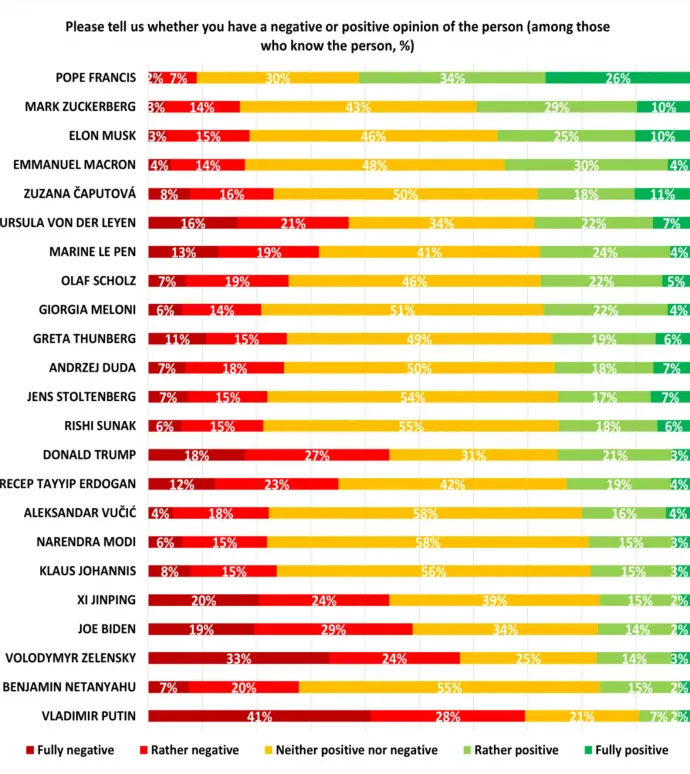
Nearly two-thirds of Fidesz voters have a negative opinion of Joe Biden, with just under 10% of them giving the US president a favourable rating. Volodymyr Zelensky also has a particularly poor rating among supporters of the governing party and Mi Hazánk: the majority of Fidesz-KDNP (74%) and Mi Hazánk (78%) voters have a negative opinion of him, while only 37% of the six-party opposition supporters have a similar opinion. It is significant that even among opposition voters, the proportion of those who have a positive opinion of Zelensky is not particularly high.
Policy Solutions' full, 100-plus page research, which in addition to these issues also looks at the global problem map of Hungarians and other questions, is available here.
For more quick, accurate and impartial news from and about Hungary, subscribe to the Telex English newsletter!